Xi explains how China's new development paradigm works for shared benefits
Chinese President Xi Jinping on Thursday expounded on how China's unlocked market potential, wider opening up and deepening international cooperation under the new development paradigm will offer more development opportunities and bring shared prosperity to the world.
Chinese President Xi Jinping on Thursday expounded on how China's unlocked market potential, wider opening up and deepening international cooperation under the new development paradigm will offer more development opportunities and bring shared prosperity to the world.
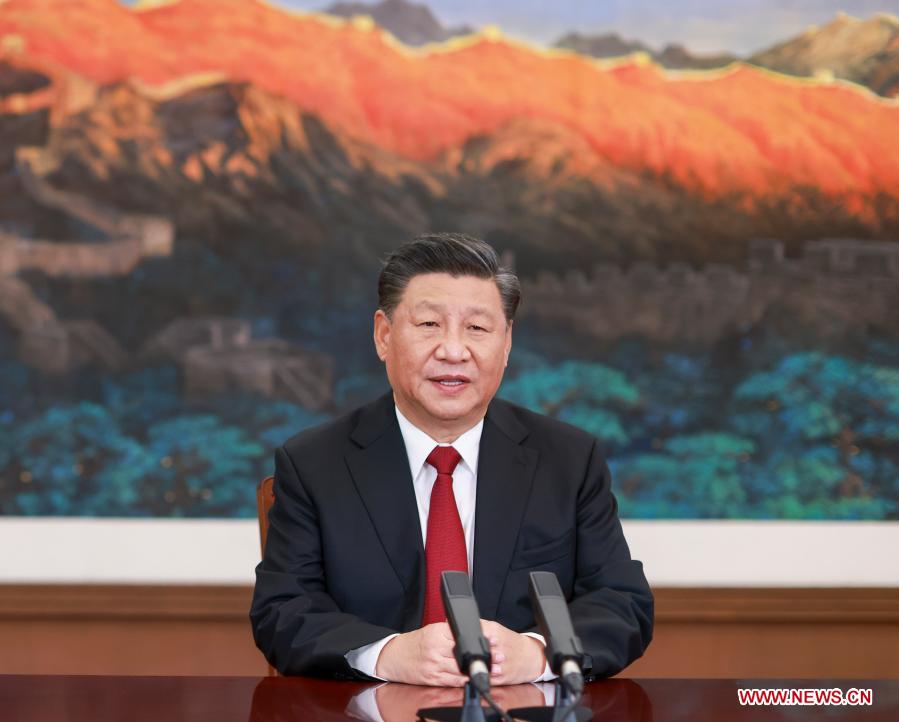
Chinese President Xi Jinping delivers a keynote speech at the Asia-Pacific Economic Cooperation (APEC) CEO Dialogues via video link, in Beijing, capital of China, Nov. 19, 2020. [Photo/Xinhua]
Addressing the Asia-Pacific Economic Cooperation (APEC) CEO Dialogues via video link, Xi said the COVID-19 pandemic has accelerated changes unseen in a century in the world, warning of increasing risks and uncertainties in the world economy caused by mounting unilateralism and protectionism.
"However, peace and development remain the underlying trend of our times. Meeting challenges through cooperation is the only way forward for us in the international community," Xi noted.
Taking into account China's domestic development and changes in the external environment, the country's top leadership has made a strategic decision to foster a new development paradigm with the domestic circulation as the mainstay and internal and external circulations reinforcing each other.
Strategic priority
Elaborating on the new paradigm, Xi said China will expand domestic demand as a strategic priority and ensure smooth flow of economic activity, vigorously make scientific and technological innovations to foster new growth drivers, while continuing to deepen reform and energize the market.
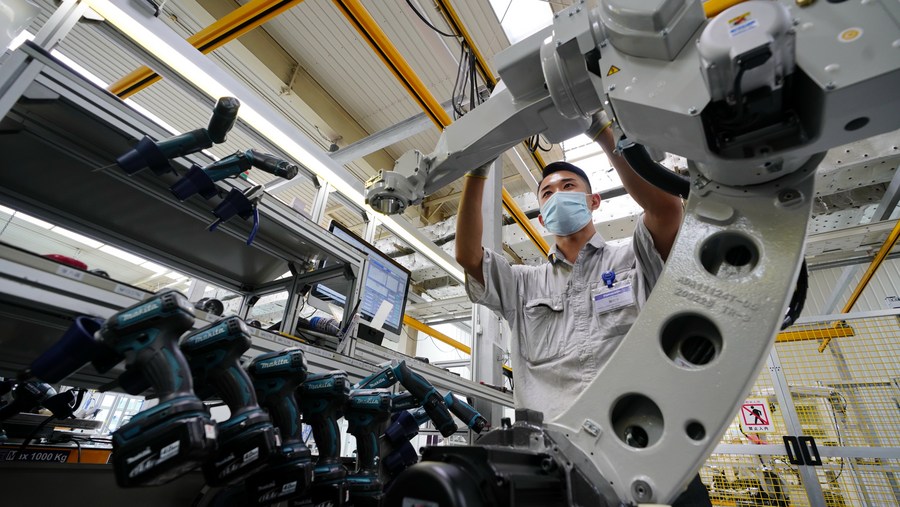
A staff member adjusts a welding robot at Panasonic Welding Systems (Tangshan) Co., Ltd in Tangshan, north China's Hebei Province, July 16, 2020. [Photo/Xinhua]
As China has effectively contained the virus and brought production and life back to normal, Xi said the fundamentals sustaining the country's steady and long-term economic growth remain unchanged, noting China has full confidence and ability to maintain stable economic performance.
China has embraced its best quarterly economic performance of the year in the third quarter, with a year-on-year expansion of 0.7 percent in the first nine months, as the first major economy to return to growth following the economic fallout of COVID-19.
The coronavirus pandemic continues to rage globally. According to a report from the International Monetary Fund, the global economy is projected to contract by 4.4 percent in 2020, while China's economy is expected to grow by 1.9 percent, the only major economy to register positive growth in the pandemic-hit year.
By fostering the new development paradigm, China is not pursuing a closed-door circulation, but open and mutually reinforcing domestic and international circulations, Xi noted.
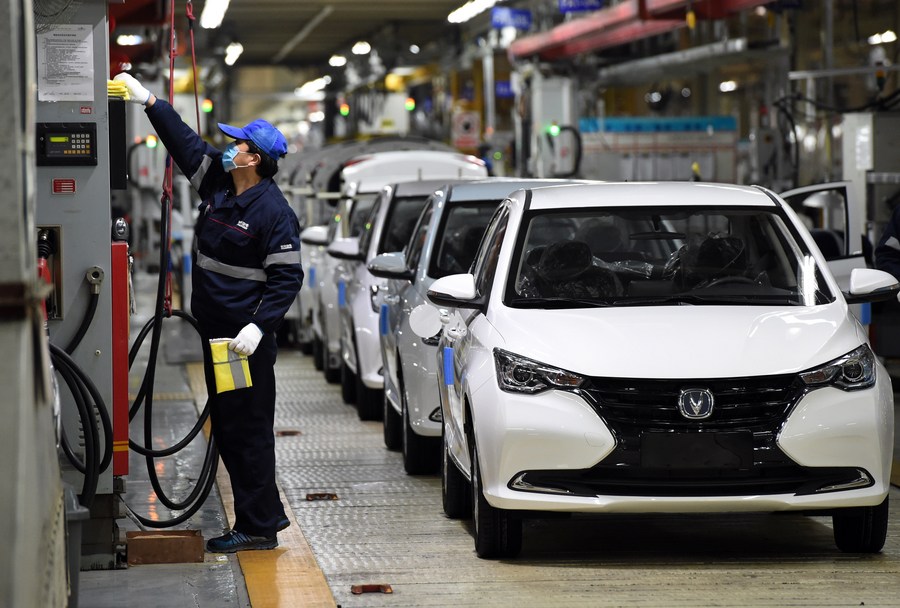
A man works at a workshop of Hefei plant of Changan Automobile in High-tech Industry Development Zone in Hefei, east China's Anhui Province, Feb. 26, 2020. [Photo/Xinhua]
"It is clear that no economic recovery from the current global economic slowdown is possible without China being a major part of the equation," noted Rohana Mahmood, chair of APEC Business Advisory Council.
Super-sized market
Xi said the new development paradigm will enable China to fully unlock its market potential and create greater demand for other countries.
China's per capita GDP has topped 10,000 U.S. dollars, and its middle-income population has exceeded 400 million. It is projected by many international institutions that China's retail market will reach 6 trillion dollars in size this year.
"As China's economy grows, our people naturally want to lead an even better life. This will create more demand for a greater variety of quality products, technologies and services from across the world," he said.
Despite the damage inflicted by COVID-19, China's import of goods has basically recovered to the level of last year.
The China International Fair for Trade in Services held in Beijing in September saw the participation of 22,000 companies from 148 countries and regions in the online and offline events. Besides, the third China International Import Expo in Shanghai saw the value of sealed deals reaching 72.62 billion dollars.
Meanwhile, Xi vowed that China will further cut tariffs and government instituted transaction costs, and open a number of demonstration zones for creative promotion of import trade to increase import of quality goods and services.
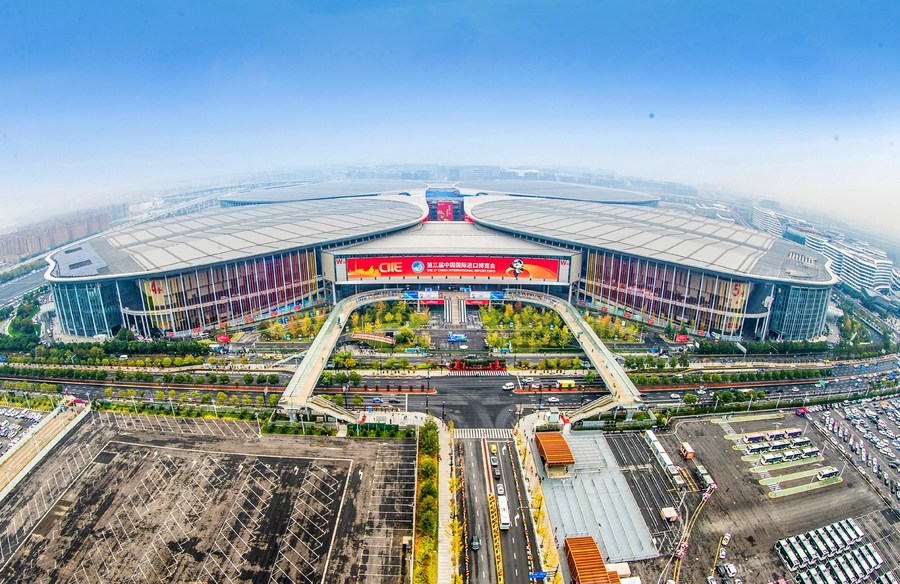
Photo taken on Nov. 3, 2020 shows a view of the National Exhibition and Convention Center (Shanghai), the main venue of the 3rd China International Import Expo (CIIE), in east China's Shanghai. [Photo/Xinhua]
Shared benefits
The new development paradigm will enable China to open up wider and share more opportunities for common development with other countries, said Xi, assuring that China's opening-up policy will not change at any time.
The country has taken many policy steps to open the country wider even in the face of added instability and uncertainty. China has fully implemented the Foreign Investment Law, easing access to the financial market and unveiling more pilot programs to promote trade in services.
China will continue to firmly support the multilateral trading system, get more actively involved in reforming the system of global economic governance and play its part to make the system fairer and more equitable, Xi pledged.
Ong Tee Keat, founding chairman of the Center for New Inclusive Asia, a think tank based in Kuala Lumpur, said he expects China's new development paradigm to bring in a new round of opening-up, providing greater opportunities and room for post-pandemic global economic recovery and development.
The new pattern will also enable China to continue to deepen international cooperation for shared benefits, according to Xi.
China will take a more active part in the international division of labor, get more effectively integrated into global industrial, supply and value chains, and more enthusiastically expand exchanges and cooperation with other countries.
Noting that the post-pandemic era will see the rise of the digital economy, Ong said growth potentials brought about by technological innovation can bring new impetus to China's future international cooperation.
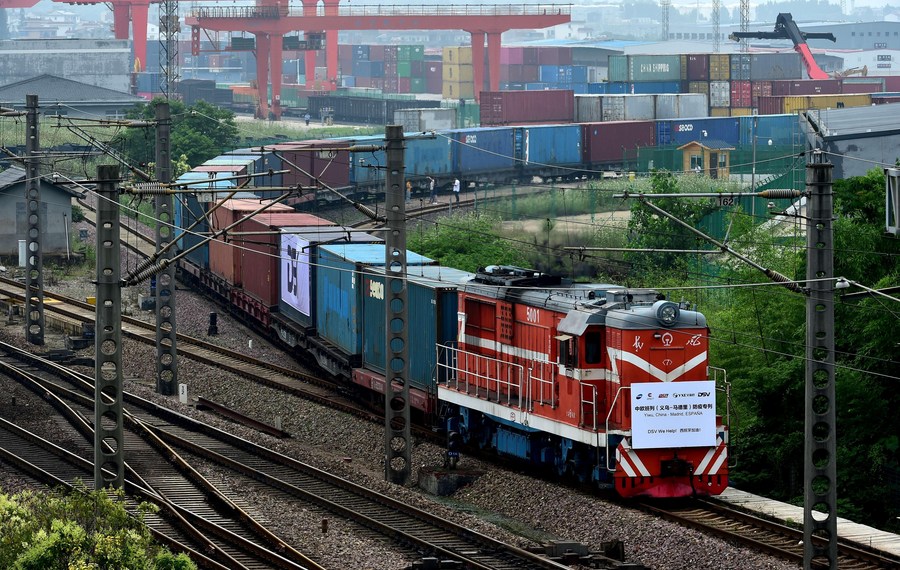
A China-Europe freight train carrying medical supplies bound for Madrid of Spain departs from the city of Yiwu, east China's Zhejiang Province, June 5, 2020. [Photo/Xinhua]
"We welcome cooperation with any region, country or company that wants to do so," Xi said, adding that China will work to pursue high-quality Belt and Road cooperation with its partners, and seek greater complementarity between the development strategies and connectivity plans of regions and countries concerned.
Xi said the development of the Asia-Pacific and greater economic cooperation in the region will continue to be imbued with strong vitality.
"Let us not forget that we are a community with a common stake, and let us move toward closer regional economic integration," Xi said.

